Schoolboy rugby star Alex Noble sustained a catastrophic injury – and found a new way to live
My left cheek hit the dirt first. The momentum of the tackle carried the rest of my body over the top of my head, cracking my neck. Instantly, everything stopped. Everything went silent. Everything went cold.
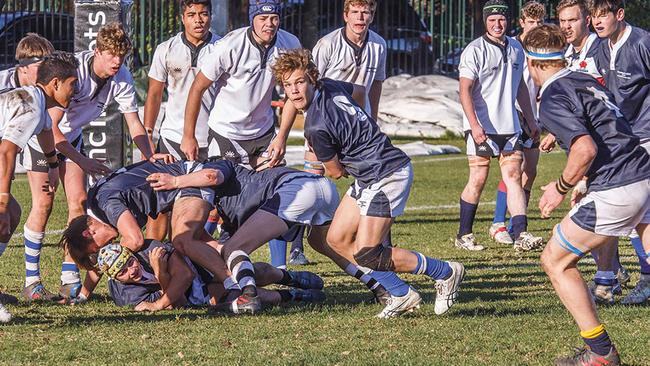
Rugby was the first thing on my mind when I woke up. It was also the last thing on my mind when I’d gone to bed the night before – I would always lay my kit out on the floor of my bedroom so I could jump into it the second I got up. I even placed it in order – boots at the bottom, then socks, then shorts, and finally my shirt at the top.
So the first thing I saw when I opened my eyes on Sunday October 21, 2018, was my blue and green shirt, my NSW Rugby training shorts, and my white Asics boots waiting for me like a chalk outline at a crime scene.
That morning, I was trialling to be selected for the under-17 NSW rugby sevens team, which was a pretty big deal for me.
I woke up at 6am, dived into my gear and went to check that my Dad was out of bed. I was still on my L-plates, so technically I needed adult supervision for the drive to the training session at Knox Grammar School’s oval that morning, and Dad had signed up for the job.
“Dad, you ready?” I said into the darkness of my parents’ bedroom. I heard a grunt and then a “Yeah” in response. I met Dad out front and stuck my L-plates onto the Mazda. Dad got into the passenger seat and immediately tuned the radio to his favourite AM station. My Dad is a pretty knowledgeable guy, he loves to soak up information like a sponge. But listening to the morning news was definitely not my favourite way to get pumped for a training session. I couldn’t really argue, though, seeing as I was the reason he was up so early on a Sunday morning. Dad and I didn’t talk much in the car. I was so focused on rugby that it was all I had the brain space for, and it never occurred to me that I could have talked to him about it, let alone asked for advice. I thought I knew it all, that I had everything under control.
As we drove it started to rain. I turned on my windscreen wipers and watched them swipe the droplets against the glass. It was a miserable day, overcast and gloomy, but nothing could dampen my excitement for the training session that lay ahead. When we arrived at the oval I jumped out of the car, leaving Dad behind as I headed straight for the grandstand where I could see the other players getting strapped up.
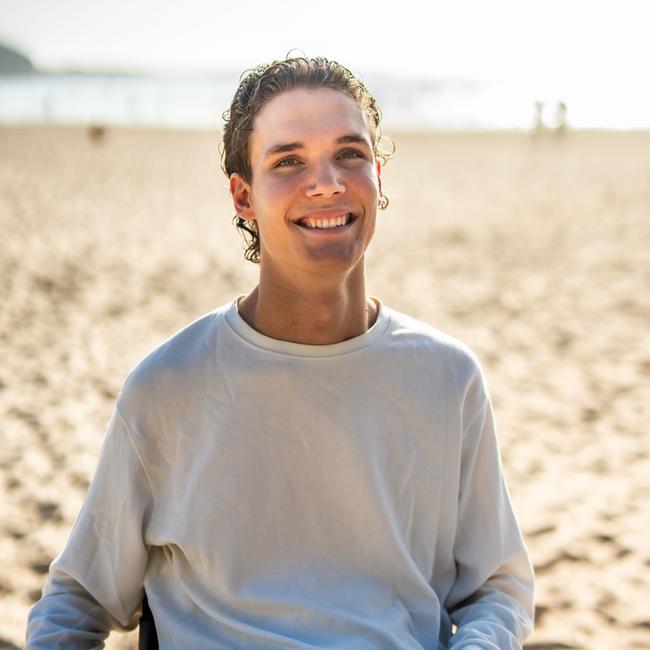
I’m ashamed to say it now, but the truth was that I didn’t want to be seen with my Dad. Don’t get me wrong, I love my Dad, but I was trialling for the open Sevens, and most of the boys were a year or two ahead of me in school. I wanted to seem cool in front of them, grown up, and showing up with my old man wasn’t exactly the look I was going for. Dad hung around for a while to watch me settle in from a safe distance, before heading off.
At the grandstand, I shook hands with the other guys. Obvious outliers as Year 10 students in a group of predominantly Year 11 and 12 boys, my mates Tom, Hamish, Dally, Bill and I stuck together. We ran our warm up and drills on the sidelines, keeping to ourselves, until about halfway through the session when the coach split us up for a 7v7 simulation game, full contact.
I was more than ready to show off my skills in a game. I knew the trainers would be watching us closely, seeing how we handled ourselves and deciding who would get picked. A 7v7 game was the perfect way to really put us through our paces and test our stamina – there’s a lot more running involved when there are only seven players a side instead of the usual 15.
Twenty minutes into the game, our team was behind and feeling the pressure – defending hard for play after play as the other side edged closer to our try line. There was relief, finally, when one of my teammates pilfered the ball and we got a turnover – at last, we could get on the offence. In this crucial moment, my shot at proving myself had arrived – the culmination of early mornings in the gym and late nights alone practising in the park. It was my golden opportunity to fulfil my purpose, to achieve my dream. This was my time to shine.
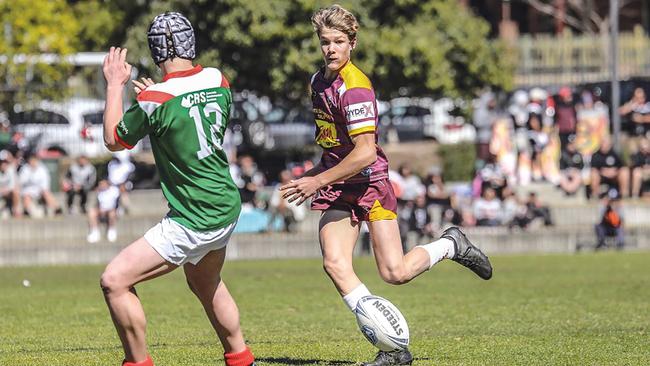
My teammate was on my left and we were both running towards the defence at high speed. He drew the defender and just before he got tackled he passed me the ball, a perfect long pass. I caught it – a nice catch, two hands, straight out in front of my chest. I tucked the ball under my right arm and I looked up. I was met by a defender from the other team. To avoid getting tackled I chucked a goose step, which is basically a movement where you slow down and then quickly speed up again. But it was contact rugby, after all, so I stuck out my left arm to palm him off at the same time. With no way to tackle my body, the player grabbed my arm; one hand on my wrist, the other on my shoulder, and he pulled me down. I was still running as he tugged at my arm, and the momentum sent me into a nosedive. My left cheek smashed into the hard dirt first. The momentum of the tackle carried the rest of my body over the top of my head, cracking my neck.
Instantly, everything stopped. Everything went silent. Everything went cold. Everything went numb. I was down. I was stuck. I couldn’t move. I couldn’t feel a thing.
The last thing I can remember was myparents telling me everything was going to be OK. But four days later I woke up in a bed, totally unaware of where I was, what day it was, what time it was or what had happened to me. I had a split-second thought that I was just waking up in my normal body, in my normal bed at home – you know that feeling, when you’re disorientated in those first few moments after waking up from a great nap? But I went to turn my head and I couldn’t. Went to get up, and I couldn’t. Went to talk, and I couldn’t. I fell into a state of shock. I was so scared. I lay there with my legs, arms and head pinned to the bed, unable to move or make a sound. So, I just stared straight up to the white ceiling above me. It was me and the ceiling.
It took me a while, but eventually – after the grogginess of waking up from a four-day coma died down a bit – in my peripheral vision, I could see wires and tubes and cords and monitors and machines everywhere. I could also hear the machines humming and beeping at the same time. They were hooked up to my stomach, chest, arms, hands, shoulders, neck, mouth and nose. It didn’t take me much longer to realise that I was in hospital, and the only things keeping me alive were machines. But Mum and Dad were by my side, as promised.
They had spent the previous few nights sleeping (if you could call it that) in a breakout room reserved for loved ones in the hospital. The surgeon had given them my diagnosis: I was waking up as a C4/5 quadriplegic.
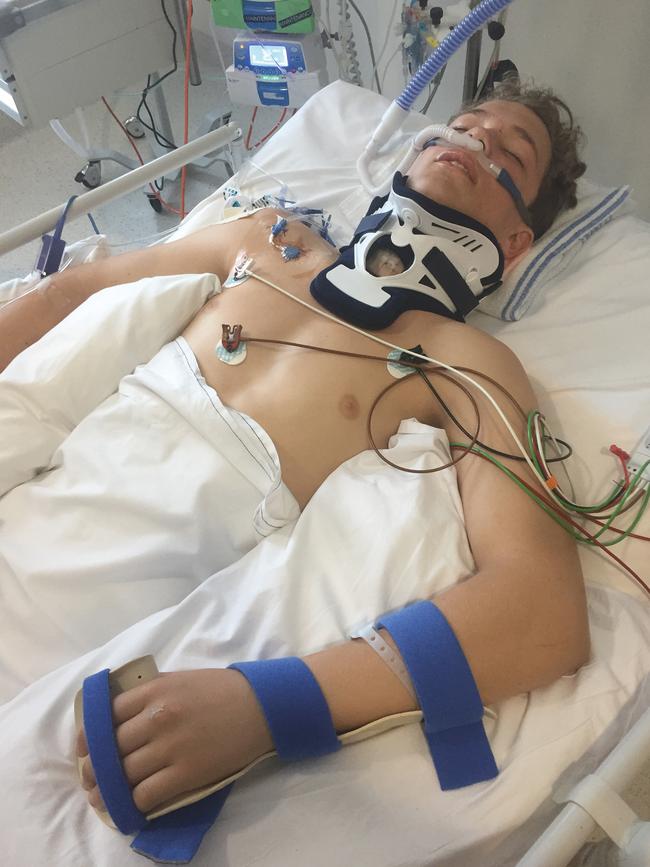
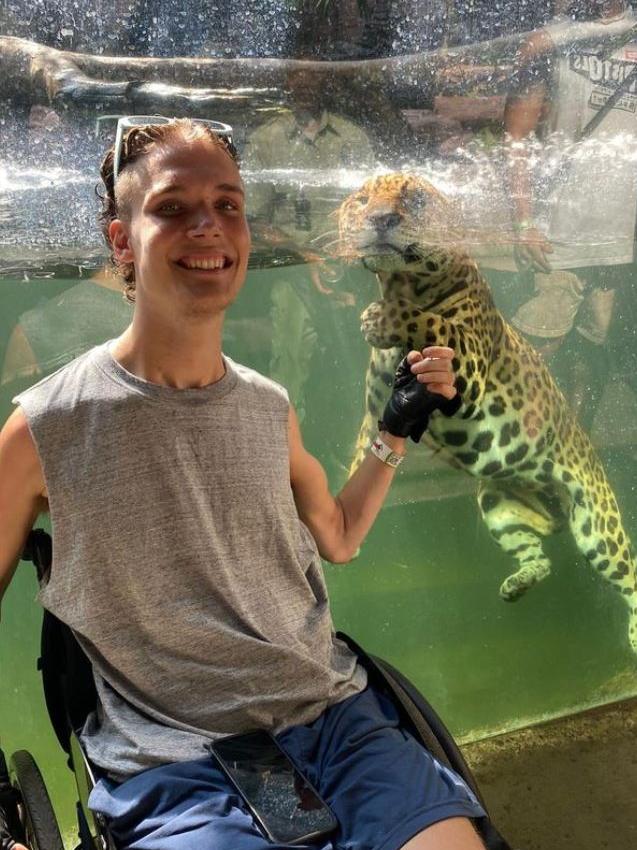
There was actually never a moment (at least not one that I can remember) when anyone explained to me what had happened. There wasn’t a point where I was told, “You’re a C4/5 quadriplegic, you’ve lost all movement in your body from your shoulders down – you’ll most likely need a wheelchair for the rest of your life and never walk again.” I didn’t ask questions, either; I don’t think I wanted to know. How definitive and depressing would the answer be? I was OK, just lying there, numbed by shock.
In my privileged life up until that point, I hardly knew anything about quadriplegia. I had never known anyone with it, which in hindsight was lucky, because it meant I was able to work out what the injury meant for me; I had no real knowledge of the limitations of a spinal cord injury. I think my parents steered clear of having the “quadriplegic” talk too, knowing it was something unproductive to say out loud.
Feeling hopeless and useless, I saw a dark path before me. A life of not being able to do things I wanted to do, to achieve the things I wanted to achieve. A life of sadness and negativity. A life of loneliness, too – because who would want to be close to someone who was nothing but a burden on others?
A life as a guy sitting in a wheelchair, just waiting for time to pass. I didn’t want that kind of life. I couldn’t have that kind of life. There’s this book I love that sort of sums up how I approached the following days in ICU. It’s The Boy, the Mole and the Fox and the Horse by Charlie Mackesy. In it, a boy and a horse are walking through a forest. The boy says to the horse, “I can’t see a way through,” and the horse replies, “Can you see the next step?” The boy says yes. And the horse tells him: “Well, just take that one.” Just focus on what’s right in front of you, Alex.
When a storm hits and there’s absolutely nothing you can do about it, sometimes you just have to let the wind take you. Sometimes that’s all you can do: hold on for dear life, ride it out and wait for the Sun to appear. And somehow I managed to take each new learning, accept it as my current reality and carry on. One challenge at a time. Looking back, that’s how I coped.
Becoming a quadriplegic has meant that I face many significant challenges every day of my life – challenges which extend far beyond just the inability to walk; challenges that no one can see. But of all of those challenges I face, there’s one that has always stood out. It’s something that echoes around my head all day and keeps me up late at night. When I got injured, I quickly came to notice just how little my body was moving around; how sedentary I was, 24/7.
I knew that not being able to walk or run around and not having the muscular strength to exercise properly meant that there was very little I could do to maintain things like my cardiovascular health and bone density. To put it simply, I could no longer take for granted the good health I once had. And so, ever since the accident, I have always had this thought that I would have a shorter life expectancy than the average person. That I would die before my friends. That I would die before my brothers. That I might even die before my parents.
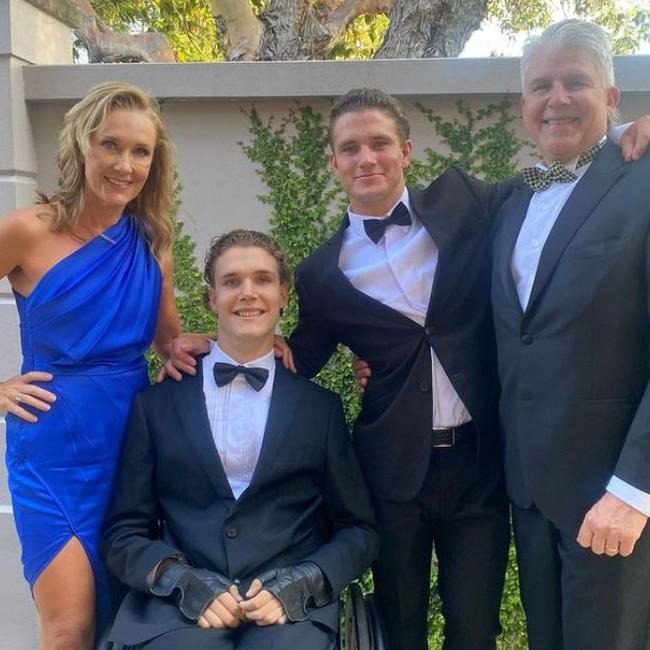
And I know what you’re probably thinking – everyone’s afraid of dying. I remember when I was in about Year 3, I was staying at my grandparents’ house in Townsville and I was lying in bed one night bawling my eyes out. Why? I was in deep thought about what happens to us after we die. Where do we go? What do we do? These thoughts continuously ran through my head. I started freaking out and I realised that once we pass away, that is it, we’re gone – erased from the planet forever. Nothing to feel, nothing to think, nothing to look at. Just blank. Just darkness. I continued to cry. I was so scared of dying. But after the accident happened, I wasn’t just scared of dying. I was scared of dying young.
Just like I never specifically asked my doctors about my quadriplegic diagnosis, I never asked them about my life expectancy either. I thought about it often, but I was too scared to find out the answer. But one day, three years after I was injured, I was sitting at my desk with the Google browser open. I stared at it, contemplating whether or not I should finally find the answer to the question that had plagued my thoughts nearly every day since the accident.
I typed in the question a few times, always deleting it before I hit enter. But after an internal tug of war that lasted about half an hour, I worked up the courage to type it in: What is the life expectancy of a quadriplegic, aged 16?
I braced myself for the results, praying to God that my fears wouldn’t be realised.
The top result read: The life expectancy of a quadriplegic, injured at age 16, is 50 years – 33.2 years less than the average male.
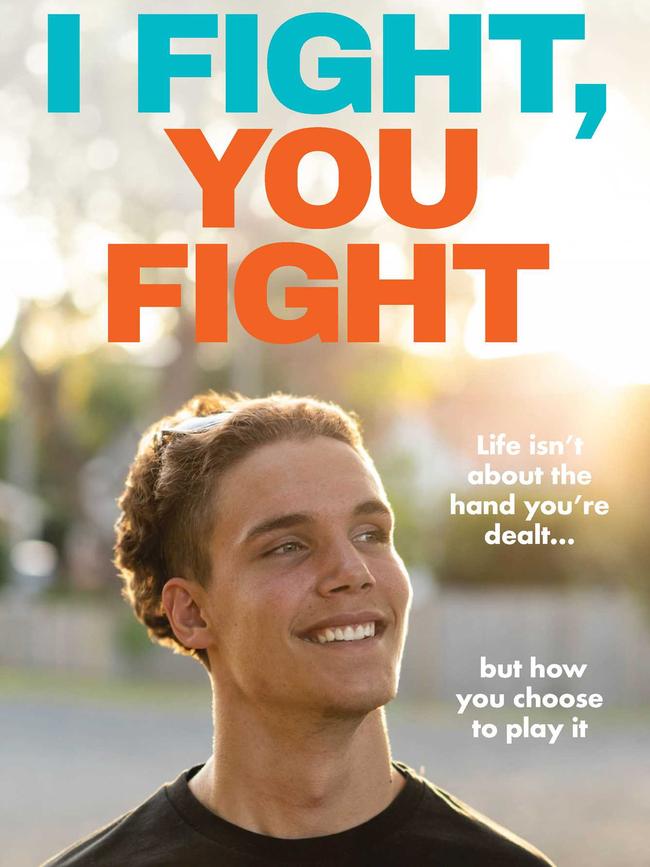
I waited for the tears. I waited for the wash of pain and sadness. But … they didn’t come. The words on the screen didn’t traumatise me, didn’t get me down, didn’t imprison me. I didn’t sit there and cry and give up. Instead, the exact opposite happened. In that very moment, my entire life changed. I became completely liberated. In learning about my own death, I learned to live – and I figured out exactly how I wanted to do it. I knew, in that moment, that I would rather spend 40 years on Earth lived to the absolute fullest than 80 years tiptoeing through life trying to make it to the end comfortably and safely.
Nowadays, it’s not death that I’m afraid of. It’s not even the thought of dying young that scares me either. Rather, it’s the thought of getting to the end of my life and realising that I could have done more. Realising that I could have been more. Realising that I had untapped potential. Realising that I lived a life that was less than the one I was capable of living. Dying doesn’t scare me, but not reaching my full potential absolutely terrifies me.
Alex Noble, 21, is in his final year of a Bachelor Law Bachelor of Business at the University of Technology, Sydney. He has a successful public speaking career, works in a law firm, travels and runs his own boat charter business.
His book, I Fight, You Fight, is out now through Simon & Schuster. Available for purchase here.

To join the conversation, please log in. Don't have an account? Register
Join the conversation, you are commenting as Logout